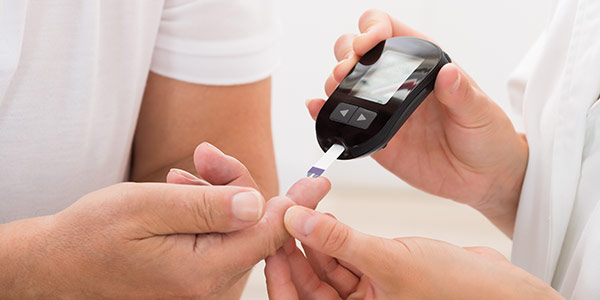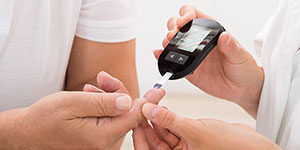Diabetes Treatment Clinic in Webster TX
Diabetes patients have symptoms such as excessive thirst or urination, exhaustion, weight loss, or blurred vision. Visit our clinic today. Dr. Smriti Choudhary, M.D., and Dr. Niraj Choudhary, M.D are experienced in diagnosing and treating diabetes. For more information, please contact us or schedule an appointment online. We have convenient locations to serve you in Webster and Pasadena, TX.




Table of Contents:
What is diabetes?
What are the first signs of being diabetic?
What is the main cause of diabetes?
How does diabetes affect your body?
Various health conditions, from diseases to injuries, require specialized care. This is especially true for chronic conditions, as these often come with a higher risk of complications and other potential problems. Diabetes is one of these chronic diseases requiring specialized care and is associated with a multitude of complications, from neuropathy (nerve damage) to blindness. Therefore, dedicated medical facilities that focus on helping diabetics, sometimes called diabetes treatment clinics, have become more widely available and can provide top-level care for the condition.
Diabetes is a chronic, metabolic disorder characterized by elevated levels of glucose in the blood. Glucose, which is derived from carbohydrates, is the primary source of energy for the body’s cells and is necessary for normal functioning. Diabetes is caused when the body does not produce enough insulin, which is responsible for regulating the body’s glucose levels. Insulin is a hormone that is produced by the pancreas, and it helps control levels of sugar in the blood. When someone suffers from diabetes, their body does not produce enough insulin to regulate their blood sugar levels. Without sufficient insulin, glucose accumulates in the blood instead of being used as energy by the cells. This can result in several severe complications, such as circulatory problems (lack of blood flow to the extremities) and neuropathy (nerve pain or other nerve-related symptoms such as paresthesia).
Diabetes is one of the most common chronic conditions in the United States and affects millions of people around the world. Research has shown that the condition has a genetic predisposition, as children of parents with diabetes are more likely to be affected by the condition than those who are not. It is associated with an array of symptoms, including increased thirst, frequent urination, fatigue, and blurry vision. Diabetes can also be caused by environmental factors and can be managed with diet, medication, and lifestyle modifications. Without proper care, diabetes can lead to serious health complications such as kidney or heart disease, or nerve damage.
The first signs of diabetes may include:
• Hunger and fatigue
• Peeing more often and being thirstier
• Dry mouth and itchy skin
• Blurred vision
• Yeast infections
• Slow-healing sores or cuts
• Pain or numbness in feet or legs
The causes of diabetes are different for each type (1 and 2) and are as follows:
Type 1 Causes — Type 1 diabetes is characterized by the immune system attacking the cells in the pancreas that make insulin. This autoimmune reaction causes diabetes by depleting the body’s insulin levels to the point where it cannot function normally. There is no specific cause for type 1 diabetes, but the following factors may be involved:
• Viral or bacterial infection
• Chemical toxins within food
• Unidentified component causing an autoimmune reaction
Type 2 Causes — Type 2 diabetes is often caused by a variety of factors, such as a family history of type 2 diabetes. Other causes include:
• Obesity
• Living a sedentary lifestyle
• Increasing age
• Bad diet
Diabetes can have a profound effect on the body and affect it in many ways, including:
• Risk of Stroke
• Extreme Thirst
• Sweet-Smelling Breath
• Risk of Heart Disease
• Fatigue and Lack of Energy
• Pancreas Malfunction
• Excessive Urination
• Damaged Blood Vessels
• Nerve Damage
• Foot Problems
• Loss of Consciousness
• Visual Disturbances
• Cataracts and Glaucoma
• Risk of Infections
• High Blood Pressure
• Gastroparesis
• Protein in the Urine
• Ketoacidosis
• Dry, Cracked Skin
If you or someone you love has diabetes, the medical professionals at the Primary Care Center of Clear Lake can help you better manage your condition. Contact us today or book an appointment online at our diabetes treatment clinic. We are conveniently located at 13920 Osprey Ct, Suite C, Webster, TX 77598. We serve patients from Webster TX, Bacliff TX, Dickinson TX, Seabrook TX, League City TX, Clear Lake City TX, and surrounding areas.
Check Out Our 5 Star Reviews


Additional Services We Offer
• 2D ECHO
• ABI Testing
• Obesity Medicine
• Alzheimer’s Disease
• Anxiety Disorder
• Aortic Aneurysm Screening
• Arthritis
• Asthma
• Body Composition Testing
• Cancer Screening
• Carotid Doppler
• Chronic Condition Management
• Chronic Kidney Disease
• Chronic Obstructive Pulmonary Disease
• Congestive Heart Failure
• COPD & Asthma
• Coronary Heart Disease
• COVID-19 Testing
• Dementia Screening
• Depression
• Diabetes Management
• EKG
• Food Allergies
• Food Sensitivity
• Geriatric Care
• Hypertension
• Outdoor Allergies
• Parkinson’s Disease
• Primary Care
• Resting Metabolic Rate Testing
• Thyroid Scan
• Wellness Exams for Men
• Wellness Exams for Women
• Ozempic
• Integrative Medical Weight Loss
• Men’s Health
• Testosterone Replacement Therapy
• Erectile Dysfunction
• Testosterone Gel and Injections
• Women’s Health
• Menopause
• PCOS
• Hormone Replacement Therapy
• Individual Nutritional and Lifestyle Counselling
• Indoor Allergies
• Internal Medicine
• Lipid Disorders
• Medical Weight-Loss
• Osteoporosis

Additional Services We Offer
• 2D ECHO
• ABI Testing
• Obesity Medicine
• Alzheimer’s Disease
• Anxiety Disorder
• Aortic Aneurysm Screening
• Arthritis
• Asthma
• Body Composition Testing
• Cancer Screening
• Carotid Doppler
• Chronic Condition Management
• Chronic Kidney Disease
• Chronic Obstructive Pulmonary Disease
• Congestive Heart Failure
• COPD & Asthma
• Coronary Heart Disease
• COVID-19 Testing
• Dementia Screening
• Depression
• Diabetes Management
• EKG
• Food Allergies
• Food Sensitivity
• Geriatric Care
• Hypertension
• Outdoor Allergies
• Parkinson’s Disease
• Primary Care
• Resting Metabolic Rate Testing
• Thyroid Scan
• Wellness Exams for Men
• Wellness Exams for Women
• Ozempic
• Integrative Medical Weight Loss
• Men’s Health
• Testosterone Replacement Therapy
• Erectile Dysfunction
• Testosterone Gel and Injections
• Women’s Health
• Menopause
• PCOS
• Hormone Replacement Therapy
• Individual Nutritional and Lifestyle Counselling
• Indoor Allergies
• Internal Medicine
• Lipid Disorders
• Medical Weight-Loss
• Osteoporosis





